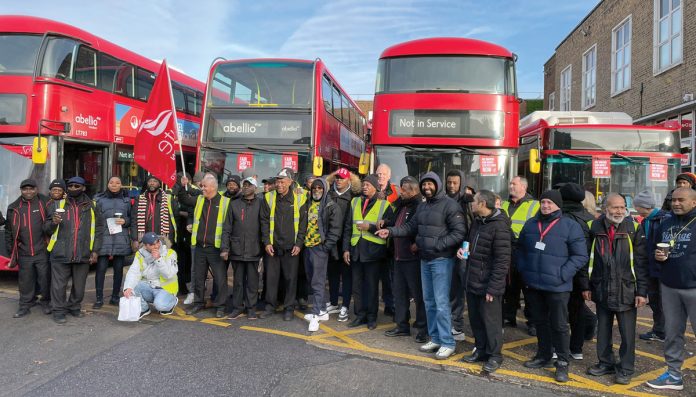Adam Goulcher, Gloucestershire Socialist Party
Labour has promised that if it wins the next general election, it will give councils powers to franchise bus services – setting routes, fares and services, as the Greater London Authority does in the capital – and set up public, municipal, bus-operating companies.
Will this finally reverse the chaos and damage of nearly 40 years of privatisation and deregulation?
Four decades of failure
Buses outside London were privatised and deregulated in 1986. 70% of services ended up operated by the ‘big 5’ operators as local monopolies, with high fares and poor services.
Fares have doubled in real terms since 1987. And bus trips halved from four billion to two billion.
Outside London, where services are not profitable, they are subsidised by councils. 40% of operators’ income is public subsidy. But council-funded spending on these services has fallen by 45% in real terms since 2008, meaning many people have lost access to health services, education, work and shops.
Bus reform
Several ‘Transport Acts’ have tried to address the failures of deregulation – fewer services, high fares, poor integration, excess profits etc. But these have always followed the ‘free market’ model, with the emphasis on ‘partnerships’ between councils and private operators.
Without democratic public ownership and control, virtually nothing has changed. Lobbying by the privatised bus operators, major funders to the Tory Party, helps ensure progress does not take place.
A ‘London model’ could be introduced by Labour councils under existing powers. But they haven’t.
Greater Manchester’s ‘London-style system’ is yet to be delivered by Labour mayor Andy Burnham. Work began on this arrangement in 2008!
Labour’s limited plans
But Labour’s franchising plans leave operations in the hands of the major bus companies. They take profit from the sector, whilst exploiting bus workers. To provide improvements, additional public funding is required.
Council powers to own and operate municipal bus companies are welcome. However, many questions are unanswered by Labour.
How will councils acquire the fleets and depots required? Will Labour offer compulsory purchase powers and the funds to use them? What compensation will be paid to the private operators? Will funding be provided to expand routes and frequencies, and reduce bus fares?
Without funding, the proposed measures will change little. Labour has refused to commit to the spending levels required to transform public transport services.
Socialist alternative for transport
The Socialist Party calls for a different approach. We demand a fully funded, free, integrated, green, publically owned and operated public transport system, run democratically. Transport companies should be nationalised, with compensation provided only where there is proven need – not to the fat cats. This would provide the backbone for an efficient needs-based socialist economy.








